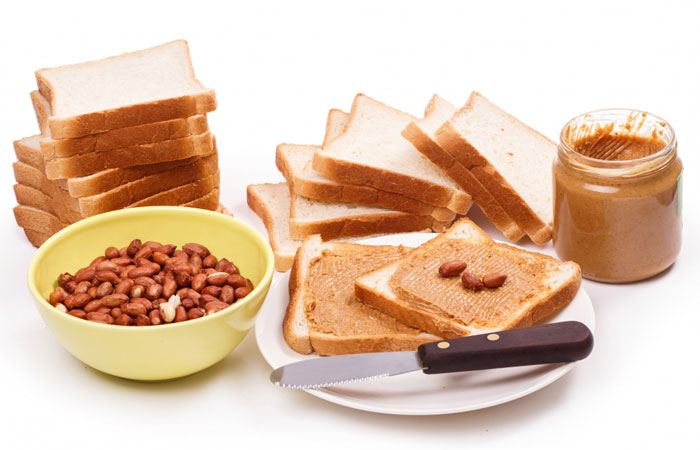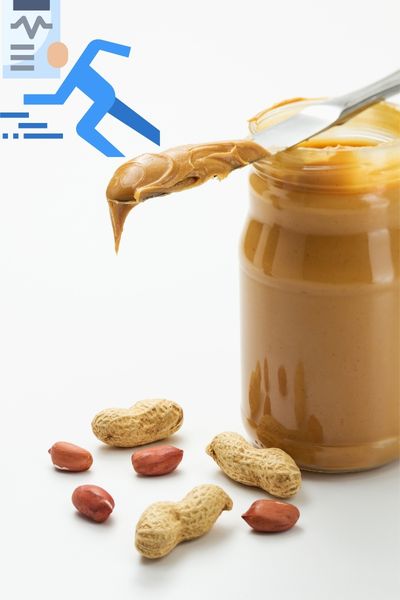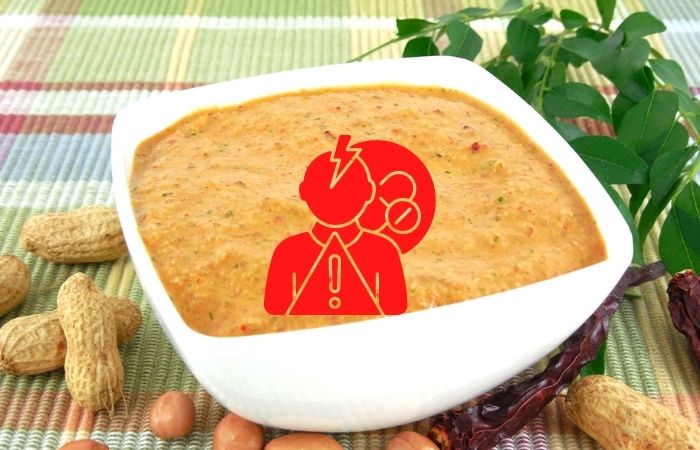
Peanut butter is a protein-filled spread well-known throughout the globe. It is made of ground peanuts, frequently roasted first, compounded into a thick paste.
Peanut butter is a paste prepared from dry, roasted peanuts. This paste is usually applied as a spread on sandwiches or toast. Peanuts, a variety of groundnuts, part of the family of Fabaceae and the classes of Arachis hypogaea.
The plant itself is miniature in which the part of the flower reaches the ground and grows beneath. It is believed to have been founded in the American continent and through Spanish explorers; it was disseminated all over the world. Not similar to high-priced nuts such as pistachio nuts, almonds, walnuts, and cashew nuts, peanuts are inexpensive nuts that present comparable benefits.
Simultaneously with their healthful nutritional outline, peanuts are a calorie-rich meal, so they are most nutritious when they are consumed in a regulated manner.
In this report, we present the nutritional outline of peanuts, their health benefits, and how various types compare.
- Peanut Butter Nutrition
- Health Benefits of Peanut Butter
- 1) Healthy Nerves and Muscles
- 2) Improvement of Your Skin Health
- 3) Staving off Toxins
- 4) It is Good For Pregnant Women
- 5) Reduction of Blood Pressure
- 6) It is Good for Muscle Recovery
- 7) It will Make you be Active
- 8) It Supports Bone Health
- 9) Enables Sound Sleep
- 10) Source of Plant-Based protein
- 11) Goes well with Most Meals
- 12) Good Source of Energy
- 13) Increase Hair Growth
- 14) Battle Depression
- Side Effects of Peanuts (Groundnuts)
- How on Earth Do I Eat Peanuts
- Conclusion
Peanut Butter Nutrition
Conforming to the USDA National Nutrient Database, peanut butter can be healthy food that is packed with nutrients such as carbohydrates, proteins, monounsaturated fatty acids, folate, niacin, pantothenic acid, pyridoxine, riboflavin, thiamin, vitamin E, vitamin C, vitamin A, sodium, magnesium, calcium, manganese, phosphorus, selenium, copper, zinc, and iron. Peanuts may include no saturated fats and can be eaten daily. They only include unsaturated fats.
This is great news for people who are worried about gaining weight by eating peanuts. Peanuts really help you to drop weight.
Nutrition details for a Hundred (100) grams of raw peanuts:
- Calories – 567
- Sugar – 4.7 grams
- Fiber – 8.5 grams
- Water -7%
- Protein – 25.8 grams
- Fat – 49.2 grams (Omega6- 15.56g, Saturated – 6.28 g, Monounsaturated – 24.43 g, Polyunsaturated – 15.56 g, Trans-0g, Omega3-0g)
- Carbs – 16.1 grams
Health Benefits of Peanut Butter

Aside from its great taste, peanut butter may have important nutrients that are necessary for the body. Here Are Some Amazing Health Benefits of Peanuts which include the following:
1) Healthy Nerves and Muscles
Magnesium is a vital mineral that stimulates more than 300 biochemical responses in the body. The nutrient has been proved to help combat fatigue, muscle cramps, and headaches.
Peanut butter is a great source of magnesium, including about 15% of your RDA in one two-tablespoon portion. That implies PB can help in body temperature management, detoxification, energy generation, the development of strong bones and teeth, and the preservation of a healthy nervous system.
2) Improvement of Your Skin Health
Discussing vitamin E, in supplement to the healthy fats that assist your body to assimilate fat-soluble vitamins, peanut butter also appears to be high in vitamin E. The butter includes 2.9 milligrams of vitamin E per two-tablespoon serving or 15 percent of your everyday value. Vitamin E is essential for countering cancer, heart disease, eye disorders, and cognitive decline.
Most prominently, antioxidant vitamin E can help preserve your skin from the harmful effects of free radicals from UV vulnerability. Furthermore, the monounsaturated fats in peanut butter will keep your skin elegant and simply bright.
3) Staving off Toxins
Peanuts’ poly and monounsaturated fats aid fat-soluble vitamins like vitamin E are assimilated by the body. Vitamin E defends against toxins such as air pollution and mitigates premenstrual syndrome. It also opposes eye disorders like cataracts and neurological diseases like diabetes and Alzheimer’s disease.
4) It is Good For Pregnant Women
Pregnant women will also acknowledge that the salty-and-sweet butter also has 28 milligrams, or 7 percent of your DV of folate, a fetal vitamin that has been revealed to help limit birth imperfections and increase growth and improvement of the fetus.
5) Reduction of Blood Pressure
Potassium is not only necessary for muscle contraction, but it also contributes a major role in decreasing blood pressure, conforming to the American Heart Association. In essence, potassium insufficiencies are connected to cardiovascular disease, osteoporosis, and type 2 diabetes, and renal disease. To guarantee peanut butter is a great food to decrease blood pressure, make sure you go for an unsalted version.
6) It is Good for Muscle Recovery
Potassium contributes to a major part of muscle health and regeneration, and the good news is that peanut butter has a large amount of this essential mineral. With 179 milligrams of potassium in every two-tablespoon serving of the nutty butter, it can also assist with alleviating muscle cramping and soreness.
7) It will Make you be Active
Peanut butter’s fiber, protein, and healthy fat outline will give you the support you need to carry on your day. It is not only excellent as a portion of your morning meal, but it also makes superb refreshments when that afternoon break comes up.
Potassium is not only necessary for muscle-flexing but also contributes a major part in decreasing blood pressure. In fact, potassium deficiencies are connected to osteoporosis, cardiovascular disease, renal disease, and type 2 diabetes.
8) It Supports Bone Health
Another fat-soluble is Vitamin K vitamin peanuts’ healthy fats that will enable your body to assimilate. Vitamin K is necessary for regular blood clotting and supports the transportation of calcium across the body, which is very essential for bone health.
9) Enables Sound Sleep
A 2-tablespoon portion of peanut butter includes 74 milligrams of the amino acid tryptophan, which is the antecedent to the sleep hormones melatonin and serotonin, making it the perfect end of the day snack to catch some sound sleep. Additionally, PB comprises magnesium, which can help ease your muscles and equip your body for a sound sleep.
10) Source of Plant-Based protein
A portion of peanut butter comprises about 8g of protein, making it a fabulous way to include cholesterol-free protein into your menu. Protein is not only beneficial for muscle growth and restoration but aids in slowing down digestion and makes you feel more pleased, more sustained.
11) Goes well with Most Meals
Peanut butter can be included in breakfast, lunch, or dinner. Not only does it goes well with bread, crackers, and pretzels, but it is properly mixed with apple sauce or yogurt, on vegetables or fruits, in smoothies, and even on meat or noodles for supper.
12) Good Source of Energy
Despite being both high in protein and fat, peanut butter is filled with a lot of calories and nutrition into little portion sizes. It is exceptional for endurance exercises, like jogging and hiking, when you need to take in calories to maintain your body well fuelled without consuming a large, substantial meal.
13) Increase Hair Growth
Few experimenters believe that as peanuts include all the protein and amino acids, they could be a great enrichment to a diet for hair growth.
14) Battle Depression
Groundnuts are reliable sources of tryptophan, which is a vital amino acid that is essential for the generation of serotonin, one of the major brain chemicals required in mood management. When depression occurs, a limited amount of serotonin may be discharged from the nerve cells in the brain. Tryptophan can improve serotonin’s antidepressant impacts when there is an improved result of serotonin in the blood.
Side Effects of Peanuts (Groundnuts)

It must be heeded that peanuts (Groundnuts) should not be eaten in abundance as they can be detrimental to the body. Some findings report that peanuts may generate allergies in some people.
Peanuts (Groundnuts) are one of the most typical food allergens. Allergy to peanuts is calculated to affect roughly 1% of Americans.
Peanut allergies are possibly dangerous, and peanuts are sometimes regarded as the most critical allergen. People that are with this allergy should shun all peanuts and peanut provisions.
How on Earth Do I Eat Peanuts
You can consume peanuts (groundnuts) in various ways – may be fried, roasted, or raw. The most reliable way to eat it on a daily schedule is in form of salad. You can also add to your breakfast cereal with groundnuts or top it with frozen yogurt. You can also connect to the internet for peanuts recipes to appreciate this healthy nut.
Several people presently fancy eating peanut butter prepared in different brands and flavors. Peanut butter is comprised of potassium and protein that reduces the danger of high blood pressure, heart disease, and stroke. Peanut butter also possesses fiber for abdominal health, healthy fats, magnesium to fortify your bones & muscles, antioxidants, and Vitamin E.
Discover Related Topics
- Healthy Pineapple Juice For Weight Loss: Facts, Nutrition, Benefits, Risks
- Best Health Benefits of Green Tea
- What are The Health Benefits of Avocado? Nutrition and Calories
Conclusion
Peanuts, and peanut butter, are some of the various nutrient-dense plant-based meals you can add to your diet. With our recipe plans and type of peanut butter choices, you might just discover a new preferred meal. Regardless if you want to combine protein for muscle building, healthy fats for your heart, or increase calories for energy, peanut butter is a resourceful method to achieve your goals.
It is absolutely fine to include reasonable amounts of peanut butter into a nutritious diet. But the principal dilemma with peanut butter is that it is so astonishingly hard to withstand.
Reasonable eating of peanut butter is not likely to have any significant negative consequences. It is more vital to stay off trans fats, sweet soda, and other extremely processed foods, if necessary.
